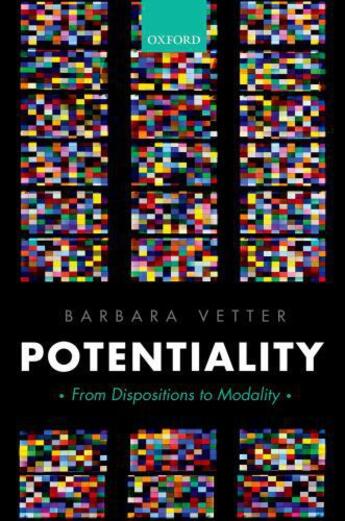Des idées de lecture pour ce début d'année !
Passionné(e) de lecture ? Inscrivez-vous
gratuitement ou connectez-vous pour rejoindre la
communauté et bénéficier de toutes les fonctionnalités du site !

Individual objects have potentials: paper has the potential to burn, an acorn has the potential to turn into a tree, some people have the potential to run a mile in less than four minutes. Barbara Vetter provides a systematic investigation into the metaphysics of such potentials, and an account of metaphysical modality based on them.
In contemporary philosophy, potentials have been recognized mostly in the form of so-called dispositions: solubility, fragility, and so on. Vetter takes dispositions as her starting point, but argues for and develops a more comprehensive conception of potentiality. She shows how, with this more comprehensive conception, an account of metaphysical modality can be given that meets three crucial requirements: (1) Extensional correctness: providing the right truth-values for statements of possibility and necessity; (2) formal adequacy: providing the right logic for metaphysical modality; and (3) semantic utility: providing a semantics that links ordinary modal language to the metaphysics of modality.
The resulting view of modality is a version of dispositionalism about modality: it takes modality to be a matter of the dispositions of individual objects (and, crucially, not of possible worlds). This approach has a long philosophical tradition going back to Aristotle, but has been largely neglected in contemporary philosophy. In recent years, it has become a live option again due to the rise of anti-Humean, powers-based metaphysics. The aim of Potentiality is to develop the dispositionalist view in a way that takes account of contemporary developments in metaphysics, logic, and semantics.
Il n'y a pas encore de discussion sur ce livre
Soyez le premier à en lancer une !

Des idées de lecture pour ce début d'année !

Si certaines sont impressionnantes et effrayantes, d'autres sont drôles et rassurantes !

A gagner : la BD jeunesse adaptée du classique de Mary Shelley !

Caraïbes, 1492. "Ce sont ceux qui ont posé le pied sur ces terres qui ont amené la barbarie, la torture, la cruauté, la destruction des lieux, la mort..."